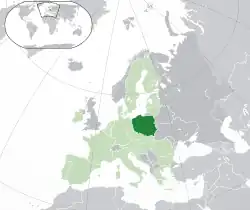.png.webp)


Rzeczpospolita (pronounced [ʐɛt͡ʂpɔsˈpɔlita] ⓘ) is the official name of Poland and a traditional name for some of its predecessor states. It is a compound of the terms rzecz "thing, matter" and pospolita "common", a calque of Latin rés pública (rés "thing" + pública "public, common"), i.e. republic, in English also rendered as commonwealth (historic) and republic (current).
In modern Polish, the word rzeczpospolita is used exclusively in relation to the Republic of Poland, while any other republic is referred to in Polish as a republika, e.g., Italian Republic – Polish: Republika Włoska.
Origins
The term rzeczpospolita has been used in Poland since the beginning of the 16th century. It was adapted for Poland, as it at that time had a unique republican system, similar to the former Roman rés pública. The famous quote by Jan Zamoyski, the Lord Chancellor of the Crown, on the importance of education is an example of its use:
Takie będą Rzeczypospolite, jakie ich młodzieży chowanie.
Such will be the Commonwealths as the upbringing of their youth.
— Jan Zamoyski, Foundation Act of the Academy of Zamość; 1600
The meaning of rzeczpospolita is well described by the term commonwealth. As a result, the literal meaning of Rzeczpospolita Polska is "Polish Commonwealth", or "Republic of Poland". Although the first Rzeczpospolita was an elective monarchy, the king had no real power, as most of the state affairs were regulated by the parliament and senate, known as the Sejm.
The Latin name for the Polish-Lithuanian Commonwealth is Rés Pública Poloniae.
Main usage
Rzeczpospolita is also used in a series of symbolic names referring to three periods in the history of Poland:[lower-alpha 1]
- I Rzeczpospolita Polska (Polish: Pierwsza Rzeczpospolita) (sometimes translated as the "First Polish Republic"), in reference to the Polish–Lithuanian Commonwealth (1569–1795). During this period, the commonwealth was ruled de facto by a privileged class called the szlachta, which had (among numerous others) the right to elect both the king and parliament (the Sejm). This political system is known as the Golden Liberty. It began with the Union of Lublin in 1569 and ended with the third and final Partition of Poland in 1795. Sometimes the term I Rzeczpospolita is used in reference to the country before the Union of Lublin too, because the szlachta started limiting king's autocracy starting in the early 1500s. The Constitution of 3 May 1791 established a common state, the Rzeczpospolita Polska (Polish Commonwealth), however the Reciprocal Guarantee of Two Nations was adopted on 20 October 1791 by the Great Sejm and modified the changes by stressing the continuity of binational status of the state.[1]
- II Rzeczpospolita Polska (Polish: Druga Rzeczpospolita), in reference to the Second Polish Republic (1918–1939). Used to refer to the interwar period, lasting from the regaining of independence in 1918 following the end of World War I up to the World War II-triggering invasion of Poland in 1939 by both Nazi Germany and the Soviet Union. The renascent Polish State was initially called the Republic of Poland (Polish: Republika Polska). The title Rzeczpospolita was introduced by the March Constitution of Poland, the first article of which stated that Państwo Polskie jest Rzecząpospolitą, meaning "the Polish State is a Commonwealth".
- III Rzeczpospolita Polska (Polish: Trzecia Rzeczpospolita), in reference to the current Third Polish Republic (1990–present). This is the title of the present-day Polish state, dating from the fall of the Polish People's Republic and the reintroduction of democratic elections in Poland – the 1990 local government elections (27 May 1990) were the first democratic elections in Poland after World War II.
Other usage
Expressions that make use the concept of rzeczpospolita include:
- Rzeczpospolita szlachecka – Republic of Nobles (szlachta), another name for the I Rzeczpospolita;
- Rzeczpospolita Obojga Narodów – The Commonwealth of the Both Nations, another name for the Polish–Lithuanian Commonwealth;
- Rzeczpospolita Babińska – Babin Republic, a satirical literary society, founded by a group of nobles during the second half of the 16th century;
- Rzeczpospolita Krakowska – Free City of Kraków or Republic of Kraków (1815–1846);
- Rzeczpospolita Zakopiańska – Republic of Zakopane, a short-lasting form of an independent state, established for about a month in October 1918;
- Polska Rzeczpospolita Ludowa – Polish People's Republic, a name used formally from 1952 to 1990; was often abbreviated to simply Rzeczpospolita Polska or PRL. Sometimes refers (wrongly) to the post-war period 1944–1952.
- Czwarta Rzeczpospolita – Fourth Polish Republic, a slogan used by the political party Law and Justice.
Nowadays, the terms Rzeczpospolita and Rzeczpospolita Polska are used interchangeably, so far as they relate to the Polish state by default.
Before 1939, Rzeczpospolita was sometimes abbreviated to Rzplita in written documents, while RP is still a common abbreviation for Rzeczpospolita Polska.
The Lithuanian word Žečpospolita is a direct borrowing from Polish. The East Slavic cognates of the name are: Russian: Речь Посполитая, romanized: Rječ Pospolitaja; Ukrainian: Річ Посполита, romanized: Rič Pospolyta; Belarusian: Рэч Паспалітая, romanized: Reč Paspalitaja; the West Slavic cognates are Czech: Řeč Pospolitá; Slovak: Reč Pospolitá; and the South Slavic cognates are Slovene: Reč Pospolita, Croatian: Riječ Pospolita, Serbian: Реч Посполита, romanized: Reč Pospolita, Macedonian: Реч Посполита, romanized: Reč Pospolita, Bulgarian: Реч Посполита, romanized: Reč Pospolita.
See also
Notes
- ↑ The above list is not a complete list of official titles for the Polish State throughout its history; it is a list of those which are referred to as a rzeczpospolita.
References
- ↑ Tumelis, Juozas. "Abiejų Tautų tarpusavio įžadas". Visuotinė lietuvių enciklopedija (in Lithuanian). Retrieved 11 February 2023.
Sources
- "Polska. Historia. Trzecia Rzeczpospolita" (in Polish). PWN online encyclopedia. Retrieved 29 March 2020.